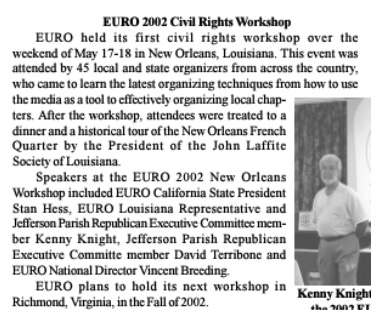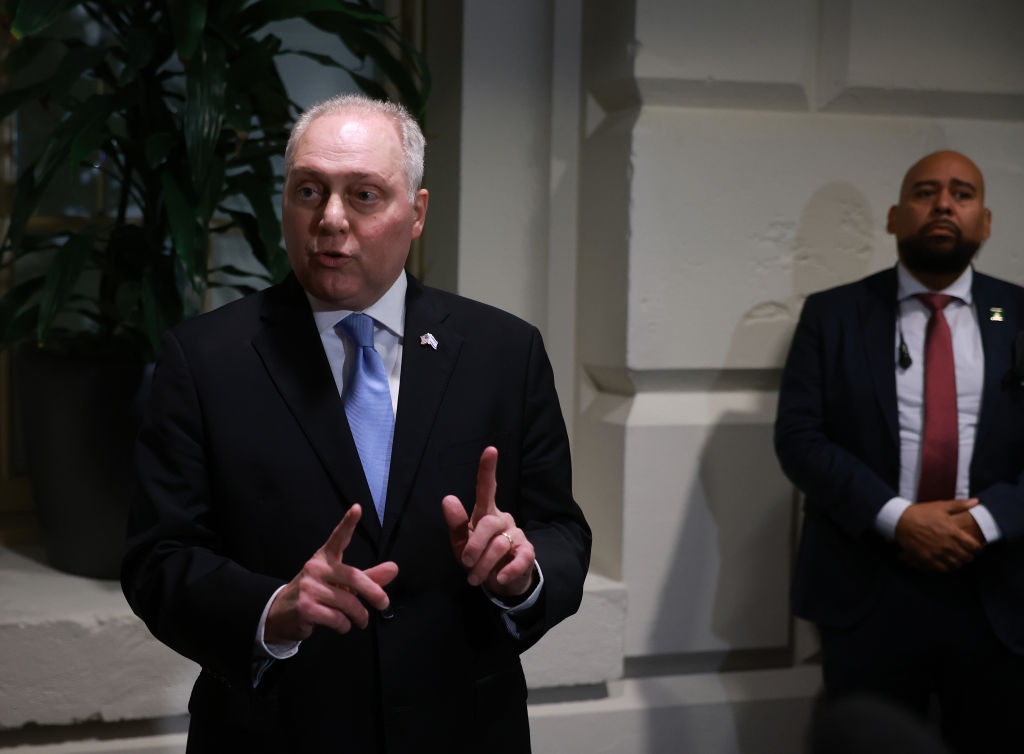Until he withdrew from contention on Thursday, House Majority Leader Steve Scalise was a leading candidate to replace Kevin McCarthy as House speaker. While the Louisiana Republican has been in the news, allegations of Scalise’s supposed ties to former Klu Klux Klan grand wizard David Duke and white supremacist groups have reemerged.
Notably, GOP Rep. Nancy Mace of South Carolina told CNN that she could not support Scalise because of the allegations. “I’ve been very vocal about this over the last couple of days. I personally cannot, in good conscience, vote for someone who attended a white supremacist conference and compared himself to David Duke,” Mace said. “I would be doing an enormous disservice to the voters that I represent in South Carolina if I were to do that.”
A comprehensive report by Snopes at the time the allegations emerged in 2014 determined that they were “unproven,” and contemporary review of the evidence by The Dispatch Fact Check leads to a similar conclusion.
What are the allegations?
Allegations of Scalise’s connection to white supremacists originated in December 2014, after the website CenLamar reported that Scalise had been an honored guest at a 2002 international white supremacist convention put on by the European-American Unity and Rights Organization (EURO) in Metairie, Louisiana. According to reporting by Snopes, the claims quickly spread to a number of other left-wing sites online, giving the impression that multiple sources had verified the allegations. The CenLamar article cites as its evidence a post on the white nationalist forum Stormfront.org, which claimed that Scalise–who in 2002 was a member of Louisiana’s state legislature—had addressed the convention’s attendees.
“In addition to plans to implement tactical strategies that were discussed, the meeting was productive locally as State Representative, Steve Scalise, discussed ways to oversee gross mismanagement of tax revenue or ‘slush funds’ that have little or no accountability,” the Stormfront post read. “Representative Scalise brought into sharp focus the dire circumstances pervasive in many important, under-funded needs of the community at the expense of graft within the Housing and Urban Development Fund, an apparent give-away to a selective group based on race.”
This forum post is the only evidence from the time of the event that Scalise made an appearance, and a recap of the event in David Duke’s newsletter did not mention Scalise’s attendance—though Duke himself was not present at the convention in person.

A Slate report in late 2014 disputed the claims that Scalise attended, however, citing Kenny Knight, a longtime associate of Duke. “He spoke early in the day to a contingent of people, prior to the conference kicking off,” Knight reportedly said. “He was not there as a guest speaker at the conference.” According to Slate, Knight and Scalise were on friendly terms—a claim that David Duke himself supported in an interview with the Washington Post. In the same interview, Duke spoke as if Scalise had indeed attended the event, but also insisted that he had no personal relationship with him. “No lunches, no dinners with Scalise. I never supported him in any campaign,” Duke told the Washington Post in a phone interview. “I didn’t get the impression that he was one of us. I didn’t cultivate a relationship. Kenny was the one who did.”
Scalise’s response.
When initially asked about the allegations in 2014, neither Scalise nor his office outwardly denied that he had attended the 2002 EURO convention. “Throughout his career in public service, Mr. Scalise has spoken to hundreds of different groups with a broad range of viewpoints,” Moira Bagley Smith, a Scalise spokesperson, told NPR. “In every case, he was building support for his policies, not the other way around.” Bagley Smith also noted that Scalise “made himself available” to anyone interested in hearing about his various policy priorities, but that he had “never been affiliated with the abhorrent group in question.”
In an interview with the Times-Picayune, Scalise said he was not aware that the group was affiliated with white supremacists. “I don’t have any records from back in 2002, but when people called and asked me to speak to groups, I went and spoke to groups,” Scalise reportedly said. “I didn’t know who all of these groups were and I detest any kind of hate group. For anyone to suggest that I was involved with a group like that is insulting and ludicrous.”
Lamar White Jr.—the author of the CenLamar blog that published the original allegations against Scalise—seems to hold the same view, noting in 2017 that he thought Scalise was “duped” by Kenny Knight and not a white supremecist. “Kenny Knight is a conman,” White also tweeted. “He’s in jail now. He hid from reporters. And then he lied to them.”
So, what happened?
More than two decades later, whether or not Scalise attended the EURO event in question is difficult to determine. The only known first-hand accounts from the convention are a single forum post on Stormfront.org and Knight’s own statements—both of which are unverifiable and in partial disagreement. Scalise and his office’s lack of outright denial suggests that he may have either attended the event or genuinely not remember, but there is no firm evidence that he knew the group was tied to David Duke or that he would have addressed anything other than specific policy issues.
Mace’s claim that Scalise “compared himself to David Duke” is also lacking in verifiable evidence. This allegation arose from an article published by Stephanie Grace in The Advocate in 2014 where she asserted that Scalise “told me that he was like David Duke without the baggage,” during a personal conversation in his early years as a Louisiana state senator. However, Grace did not record or report the statement at the time, only recalling it from memory decades later, and there are no other reports of Scalise making similar statements.
Scalise’s office did not respond when asked for comment by The Dispatch Fact Check.
If you have a claim you would like to see us fact check, please send us an email at factcheck@thedispatch.com. If you would like to suggest a correction to this piece or any other Dispatch article, please email corrections@thedispatch.com.







Please note that we at The Dispatch hold ourselves, our work, and our commenters to a higher standard than other places on the internet. We welcome comments that foster genuine debate or discussion—including comments critical of us or our work—but responses that include ad hominem attacks on fellow Dispatch members or are intended to stoke fear and anger may be moderated.
With your membership, you only have the ability to comment on The Morning Dispatch articles. Consider upgrading to join the conversation everywhere.